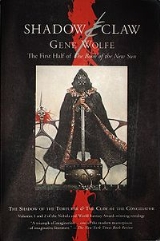
and fantasy
author Gene Wolfe
. It chronicles the journey and ascent to power of Severian
, a disgraced journeyman
torturer who rises to the position of Autarch, the one ruler of the free world. Severian, who claims that he has perfect memory
, tells the story in first person
; the books are presented by Wolfe as a translation of Severian's writings into contemporary English.
His yellow eyes held a certain clean madness.![]()
[T]he authority that punishes no one while there exists a chance for reformation will punish everyone when there is no possibility anyone will become the better for it.![]()
By the use of the language of sorrow I had for the time being obliterated my sorrow—so powerful is the charm of words, which for us reduces to manageable entities all the passions that would otherwise madden and destroy us.![]()
To those who have preceded me in the study of the posthistoric world, and particularly to those collectors—too numerous to name here—who have permitted me to examine artifacts surviving so many centuries of futurity, and most especially to those who have allowed me to visit and photograph the era's few extant buildings, I am truly grateful.![]()
We were one, naked and happy and clean, and we knew that she was no more and that I still lived, and we struggled against neither of those things, but with woven hair read from a single book and talked and sang of other matters.![]()
One who truly benefits another is for that moment at a level with the Pancreator, and in gratitude for that elevation will serve the other all his days...![]()
The brown book I carry says there is nothing stranger than to explore a city wholly different from all those one knows, since to do so is to explore a second and unsuspected self. I have found a thing stranger: to explore such a city only after one has lived in it for some time without learning anything of it.![]()
That was the brightest day I've ever seen. The sun had new life in him, the way a man will when he was sick yesterday and will be sick tomorrow, but today he walks around and laughs so that if a stranger was to come he'd think there was nothing wrong, no sickness at all, that the medicines and the bed were for somebody else.![]()

